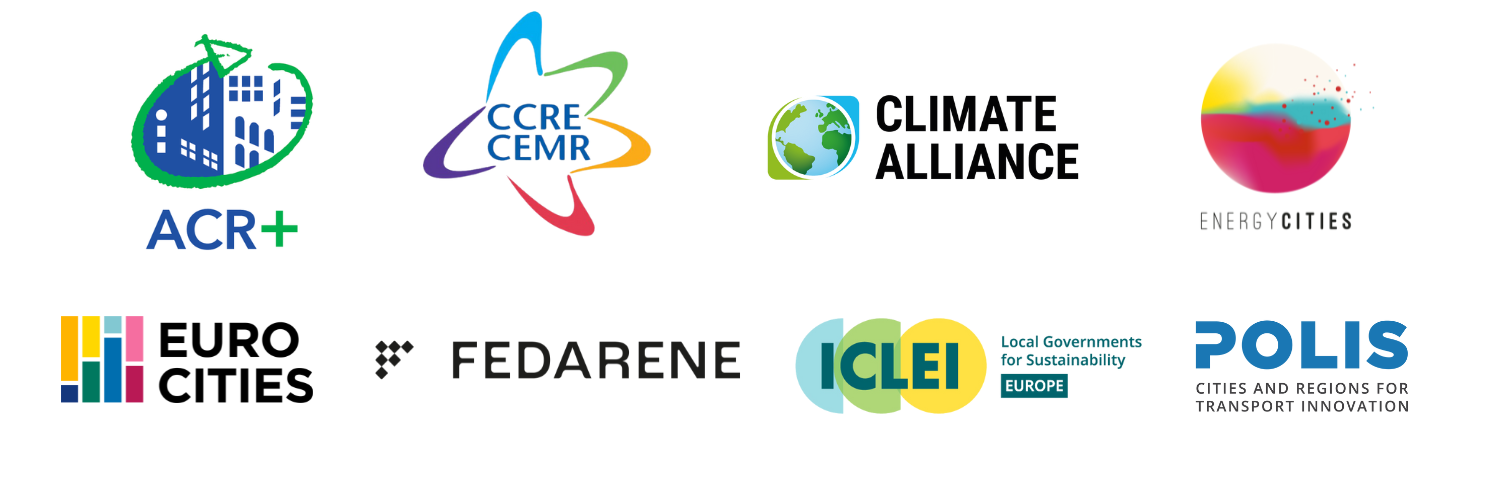Eight leading networks of European cities and regions - ACR+, CEMR, Climate Alliance, Energy Cities, Eurocities, FEDARENE, ICLEI Europe and POLIS - have come together to form the Local Alliance. In a joint letter sent on 26 March 2024, the Alliance calls on EU leaders to find new ways to effectively roll out the European Green Deal at local level.

We, the European networks of local and regional governments, representing cities and regions ranging from the smallest rural towns to the largest metropolitan capitals across all EU Member States, wish to underscore the importance of staying on course to implement the European Green Deal under this and next mandates of the European Commission. European local and regional governments have already embarked on the journey to climate neutrality and started to transform our cities and regions, as well as ways of living, heating and cooling, housing, mobility, producing and consuming for millions of European citizens. We are writing to you to reiterate our networks’ support and readiness to implement and scale up the transition to climate neutrality if enabling framework conditions for the local level are guaranteed.
Cities and regions are where at least 70% of the European Green Deal legislation must be implemented. The local level also holds the highest democratic potential, involves people directly in decision-making, and allows people to experience the impacts of political decisions first hand. In this regard, successful implementation of the Green Deal can only be achieved if European cities and regions collaborate, challenge and coordinate with local businesses, communities and civil society while empowering them to stem today’s poly-crisis including climate change, biodiversity loss, societal challenges and ongoing armed conflicts .
Today, the EU’s subnational governments mobilise around 58% of climate-significant public expenditures, surpassing their central governments2 and they also have sole or shared (with national governments) responsibility for 68.3% of all dimensions covered in Member States’ National Energy and Climate Plans (NECPs)3. European cities and regions are an integrated part of the EU’s governance system and therefore, drawing realistic climate neutral pathways will only be possible with strong mobilisation and involvement of local actors. It is of concern that the EU’s 2040 target proposal overlooks the mitigation, adaptation and investment potential of cities and regions. However, we remain ready for a dialogue to address this gap.
We emphasise our appreciation of the fruitful cooperation that has developed between local and regional governments and the European Commission over the years. We especially thank the European Commission Executive Vice President Maroš Šefčovič, the Secretariat General and all Commission services and Director Generals with whom we had a constructive and forward-looking Clean Transition Dialogue with on 15 March 2024 to discuss the implementation of the Green Deal at the local level in collaboration with business and industry.
Nevertheless, given the key role of local and regional governments in planning policies and strategies, and financing the transition, implementation of the European Green Deal will require another level of partnership between all levels of government. Financing the local transition to climate neutrality will require mobilising the EU and national budgets, as well as private finance, with a multilevel governance approach. In order to optimise the social, environmental and economic impact at the local level, the approach must be more responsive to locally developed integrated and holistic actions based on locally available skills, resources and opportunities. These opportunities are the best way to create local investment potential for European industry, and to share the transition benefits for all EU citizens.
We would like to highlight that Europe’s pace of success to achieve the Green Deal objectives will depend on creating the following enabling frameworks for cities and regions:
- More joined up support for investments from the EU, national and regional funds acrossdifferent funding programmes and actors, which are more responsive to locally developedintegrated and holistic action and investment plans. This would also be a prerequisite forcreating local jobs and markets for the European green industry.
- Cities and regions need adequate in-house skills and a workforce to successfully do theirpart of the climate neutrality transition and by doing so, to create demand for Europeanbusinesses and industries.
- Establishing structured dialogues with the local and regional level at the EU and nationallevel will be critical to achieving the necessary transformation and societal resilience at scalein Europe.
While we further develop some concrete suggestions to address European cities’ and regions’ challenges in the attached list of “Local and regional government networks’ proposals for measures to support the implementation of the European Green Deal at the local level”, we kindly repeat commitment to work with national governments, the European Council, the Commission and the Parliament to turn the Green Deal into reality for every citizen across Europe. We believe the EU’s 2024- 2029 Strategic Agenda could further build on this cooperation by streamlining and creating synergies and feedback loops from the local to the national and EU level to reinforce cities’ actions to implement the European Green Deal.
Read the joint letter.
Read the press release here.



